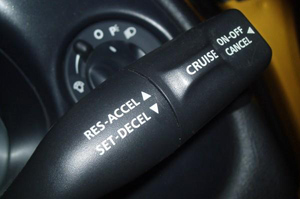
September 3, 2013
The RACQ has urged motorists not to believe myths surrounding the use of cruise control.
Emails have again appeared in in-boxes – and posts on Facebook – claiming cars have “flown through the air” due to hydroplaning while using cruise control.
RACQ Technical Researcher Russell Manning said the emails had been doing the rounds for years, and reassured motorists not all the information was accurate.
“When there is a film of water between the vehicle’s tyres and road, the car will hydroplane, but this isn’t due to the driver using cruise control,” Mr Manning said.
“If there is sufficient water on the road to cause hydroplaning, it is going to happen regardless of whether cruise control is engaged or not.
“Hydroplaning won’t cause the car to accelerate excessively or suddenly, making the vehicle feel as though it’s about to take off.
“When hydroplaning, it may feel like the car is flying but it isn’t, and it won’t.”
However, Mr Manning said there was truth to the email claim that cruise control should not be used on wet or icy roads.
“It’s a bad idea to use it when the road is icy or slippery as you can lose control,” Mr Manning said.
“The bottom line is drivers need to judge the appropriateness of using cruise control, as it will depend on the conditions.
“Cruise control should also be avoided in the city, heavy traffic, or where braking and lower speeds are needed to negotiate bends.
“But when used correctly, cruise control can have fuel consumption benefits by reducing the sudden throttle movements that waste fuel.”
RACQ’s cruise control fact sheet can be found at www.racq.com.au/cruisecontrol























